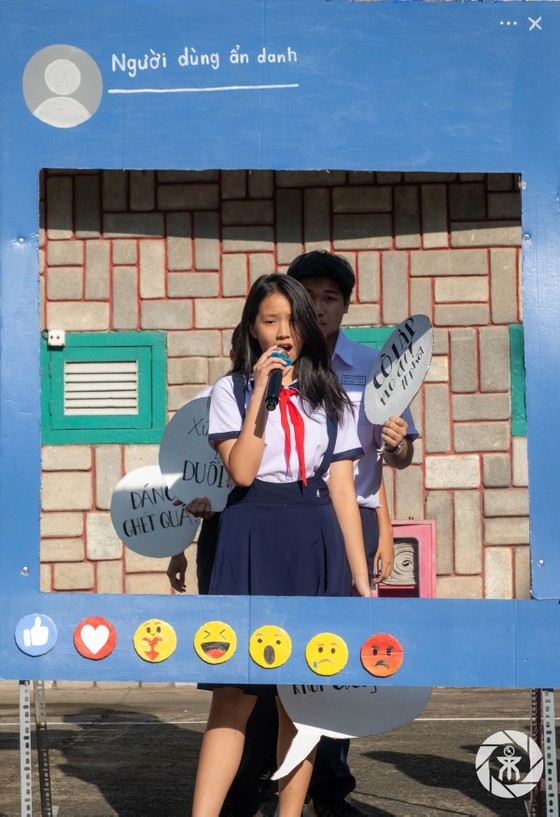 |
Tran Dai Nghia High School for the Gifted in HCMC held a formal discussion themed ‘Social Media Code of Conduct’ at the end of October 2023 |
Being a mother of a second-grader and an eleventh-grader, Thu Tuyet from HCMC shared that she is added to four social network chat groups for parents and homeroom teachers. On average, she receives hundreds of messages from these groups, which is so annoying that she has to turn off the notification function of those groups.
She commented that the information provided in such groups is sometimes rather misleading, resulting in misunderstanding and even unsuccessful communication among parents themselves or between schools and parents.
Truong Giang – father of a seventh-grader in HCMC – shared that to avoid unnecessary discussions in such a chat group between parents and teacher, the homeroom teacher of his child this year decided not to allow group members to send message, which is extremely useful to him to avoid unwanted disturbance from uncontrolled language or loss of important notices.
My Quyen – mother of an eighth-grader in District 1 of HCMC – recalled an unhappy incident in her child’s class. At the beginning of the academic year, two students had had a disagreement caused by misunderstanding, but were then back in harmony. However, in the parent chat group, the incident was continuously discussed and made many members annoyed and tired.
Students themselves also create or join various chat groups on social network sites and apps as the number of young smart phone users from 11-18 years old has increased significantly lately. They purposedly use those groups to exchange subject-related or project-related information. Nevertheless, many members are using the groups to attack their classmates or defame their teachers.
Recently, D.D. Junior High School in Binh Thanh District of HCMC has severely punished two students who directly attacked each other and one more student for recording a clip of the incident and then posting it on a social networking platform. This is the first time that disciplinary measures have been applied against students filming videos illegally.
In addition, many Fanpages of high schools are now considered a war platform instead of a place to exchange academic information. Choosing the ‘Anonymous Participant’ mode, students can use fierce comments and non-standard language to attack others or discuss such topics as boarding meal quality, timetables, exam schedules, extra-curriculum plans, training methods of some teachers, or even worse, secretly taken pictures of some students.
Aware of the seriousness of this situation, at the end of this October, Tran Dai Nghia High School for the Gifted in HCMC held a formal discussion themed ‘Social Media Code of Conduct’ to help students identify wrongdoings when using social networking platforms.
Deputy Director of the HCMC Education and Training Department Duong Tri Dung said that to establish ‘a happy school’, all schools need to pay attention to building codes of conducts, including suitable use of available functions in social media platforms.
In the upcoming time, this department is going to cooperate with related units to help students raise their legal awareness via attractive playgrounds so that they can better observe the law and fight against school violence.
Dr. Bui Hong Quan from the Psychology Faculty of HCMC University of Education shared that the use of social networks is becoming more popular among learners. Therefore, schools should organize discussions and learning projects to train them on the skills to properly exploit this tool for improvements and avoid its negative sides.
What is more, as students also use social networks at home, the care and regulations of parents are important in helping them develop appropriate behaviors on these platforms. Overuse of social networks can lead to harmful effects on both the learning process and cognitive development of children, not to mention an increase in the risk of being scammed, taken advantage of, or bullied online.
More importantly, parents should be a good model for their children to take after when accessing social networks or entering chat groups.
Teacher Vo Kim Bao from Nguyen Du Junior High School in District 1 stressed the essential role of a homeroom teacher as well as the collaboration with family in educating students about ethics and civilized behaviors on social networking sites, in shaping their personality.
To fulfill those goals, teachers must become students’ friends so that these young people are willing to share their thinking with the older and discuss possible solutions for their current problems at school. Teachers should actively learn how to use social networks effectively to orient their learners and timely handle any unwanted issues.
Teachers themselves must be flexible and patient when addressing students’ regulation violations on social networking sites. Instead of considering certain students as a good or bad person just because of some offenses, teachers must be willing to give opportunities for those regulation breakers to correct their wrongdoings. Cooperation between school and family is a necessity to ensure effective use of social networks among students.
























